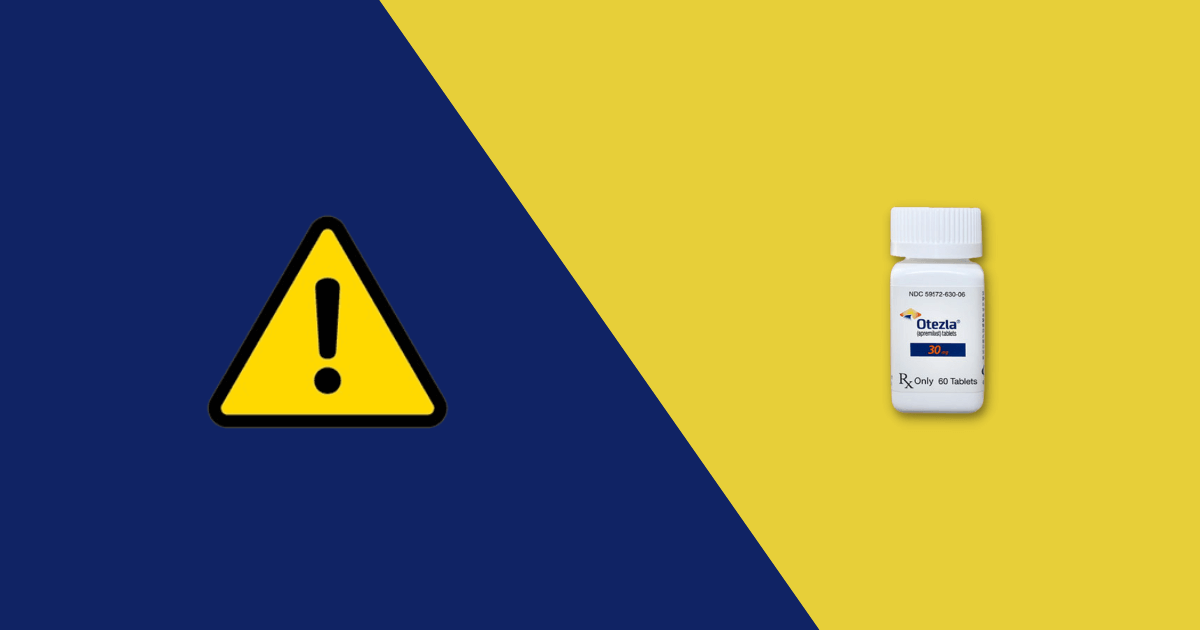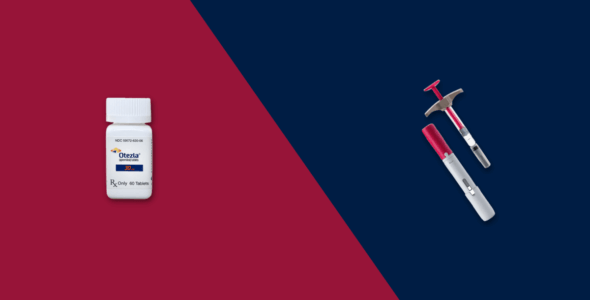Otezla side effects and how to avoid them
Table of contents
Otezla is a brand-name medication manufactured by Amgen Inc. It is used to treat moderate to severe plaque psoriasis, active psoriatic arthritis, and oral ulcers associated with Behcet’s disease. While Otezla is generally well tolerated, there are some potential side effects that people should be aware of. The most common side effects of Otezla include upper respiratory tract infections. Less common, but more serious side effects, can include severe allergic reactions.
Learn more about the side effects of Otezla and what you can do to avoid them.
What is Otezla (apremilast)?
Otezla is approved by the FDA to treat adult patients with:
- Moderate to severe plaque psoriasis that require systemic therapy or light treatment (phototherapy)
- Moderate to severe active psoriatic arthritis (PsA)
- Oral ulcers associated with Behcet’s disease
Plaque psoriasis, psoriatic arthritis, and Behçet’s disease can not be cured, but medications can help manage these conditions and reduce symptoms. Otezla can reduce the inflammation caused by your immune system that underlies these conditions, giving you relief from your symptoms and improving your quality of life.
The active ingredient in Otezla is called apremilast, a non-biologic, systemic phosphodiesterase-4 (PDE-4) inhibitor. Apremilast works by blocking an enzyme in your body called phosphodiesterase 4. This enzyme is involved in the process your immune system uses to cause inflammation. By blocking this enzyme, apremilast interrupts this process, reducing inflammation in your body. This can reduce psoriatic skin plaques, limit swelling and pain in your joints, and help clear up and prevent mouth ulcers caused by Behçet’s disease.
Otezla dosage
Otezla is available in 10 mg, 20 mg, and 30 mg tablets. The starting dose of Otezla is typically 10 mg in the morning and titrated up to a dose of 30 mg twice a day.
If you miss a dose, take it as soon as you can. If it is almost time for your next dose, skip the missed dose and take your next dose at your scheduled time.
Read the prescribing information and the medication guide provided with this medicine for the full drug information, and always speak with your healthcare provider for medical advice about any changes to your dose so they can monitor and evaluate your condition.
Otezla side effects
Side effects usually occur within the first 2 weeks of treatment, and improve as you continue to take it. The most common possible side effects of Otezla in clinical trials compared to placebo-controlled tests include:
- Injection site reactions
- Stomach pain, diarrhea
- Back pain, joint pain
- Headaches
- Nausea, vomiting
- An increase in upper respiratory tract infections
- Low red blood cells (anemia)
Otezla can cause more serious side effects, including:
- Severe allergic reactions to the medication – trouble breathing or swallowing, raised bumps (hives), rash or itching, swelling of the face, lips, tongue, or throat
- New or worsening mental health conditions, including depression, suicidal thoughts and behaviors, and other mood changes
- Severe diarrhea, nausea, or vomiting
- Weight loss
If you experience any of these serious side effects, stop taking Otezla and seek medical attention immediately. You are encouraged to report adverse effects of prescription drugs to the FDA. Visit www.fda.gov/medwatch, or call 1-800-FDA-1088.
Otezla drug interactions
Otezla can interact with other medications including:
- Rifampin, an antibiotic usually used to treat tuberculosis
- Phenytoin, phenobarbital, or carbamazepine, medications used to treat seizures and epilepsy
- St John’s Wort, an herbal supplement often taken to help with anxiety and depression
Before taking Otezla, be sure to tell your doctor about all of the medications you are taking to ensure they are safe to take at the same time.
Otezla warnings & precautions
Don’t take Otezla if:
- Are allergic to the active ingredient apremilast
- Have known hypersensitivity to any of the other ingredients in Otezla
- Are under 18 years of age
Talk to your doctor before taking Otezla if you:
- Are taking any of the medications that could interact with Otezla
- Have a mental health or mood disorder, like depression
- Have, or have had, suicidal thoughts or have ever tried to commit suicide
- Have kidney disease
- Are prone to severe diarrhea, nausea, or vomiting
- Are underweight for your height and age
- Are pregnant or are planning to become pregnant
- Are breastfeeding or are planning to breastfeed
You should always check with your doctor or pharmacist before taking any medication, including Otezla, to make sure it is safe for you.
How to avoid Otezla side effects
The best way to avoid side effects is to take Otezla as directed by your doctor. Follow your doctor’s instructions carefully and do not take more or less than prescribed.
If you experience any side effects, talk to your doctor or pharmacist. They may be able to recommend ways to help reduce or prevent some of the side effects.
1. Stick to the recommended dosage
Take your prescribed dose of Otezla that has been recommended by your healthcare professional. Do not take more or less than prescribed.
2. Monitor your blood sugar levels
If you have diabetes, it is important to monitor your blood sugar levels closely while taking Otezla. Check your blood sugar levels as directed by your doctor and report any changes to your doctor immediately.
3. Drink plenty of fluids
Drink eight to 10 glasses of water or fluids every day to help prevent dehydration, which can make side effects worse.
4. Avoid alcohol
Avoid drinking alcohol while taking Otezla as it can make side effects such as nausea, vomiting, and diarrhea worse.
5. Don’t skip meals
Eating regular meals and snacks will help to prevent low blood sugar levels (hypoglycemia).
6. Check your feet
If you have diabetes, check your feet for any cuts, sores, or redness regularly. Tell your doctor if you experience any problems with your feet while taking Otezla.
7. Know the signs and symptoms of Otezla side effects
Signs and symptoms of side effects include back pain, joint pain, and headaches. If you experience any of these symptoms speak to your doctor for medical advice.
8. Monitor your weight
Otezla may cause weight loss. If you experience this side effect while taking Otezla, get medical advice from your doctor.
9. Tell your doctor about all medications you’re taking
Be sure to tell your doctor about all other medications you’re taking, including over-the-counter drugs, vitamins, and herbal supplements, as they can interact with Otezla.
10. Get regular medical check ups
It is important to get regular medical check ups and monitor your medical conditions. Your doctor will monitor your side effects and may adjust your dose of Otezla as needed.
Medically reviewed
A medical professional has reviewed this article.


Jamie Winn, PharmD
Jamie Winn, PharmD
Dr. Jamie Winn received his Doctor of Pharmacy in 2002 from the University of South Carolina College of Pharmacy, Columbia, SC. Jamie is a medical reviewer for NiceRx.


